Ten Interesting Facts about the Geography of Canada
This year Canada will celebrate its 150th birthday on July 1st. Most of you, like me, will be out celebrating with friends and family, enjoying the amazing firework displays. Therefore, in honour of Canada’s 150th birthday, I decided to write about my favourite geography facts about Canada. We would like to hear about your interesting geography fact(s) about Canada, so feel free to submit your comments in the section below.
1. Cities with over 1 million residents 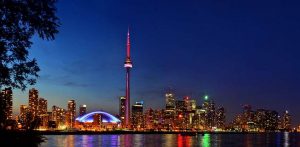
There are six cities in Canada that have a population of over 1 million: Toronto (my home town), Montreal, Vancouver, Calgary, Edmonton and Ottawa. Ottawa is also known for being the second coldest capital in the world. Brrr! Montreal is the world’s second largest French speaking city after Paris. Très Bon!
2 Second biggest country in the world 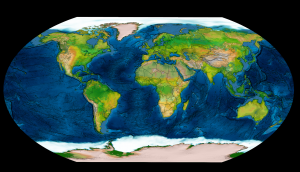
Canada is the world’s second-largest country, with the first being Russia. Even though Canada covers a larger area in comparison to the USA, it has only one ninth of its population. Canada also has the fourth lowest population density in the world, with only three people living per square kilometer. It is also worth mentioning that almost half of the population in Canada were born in other countries!
3. Disparate sizes of Provinces and Territories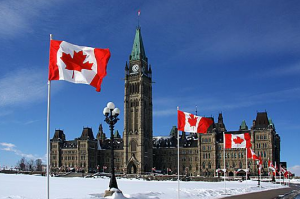
We all know that Canada has ten provinces and three territories, but did you know that Prince Edward Island is the smallest province and Quebec is the largest province? I have never traveled as far north as Nunavut, but this territory is the largest of the three territories and takes up one fifth of Canada’s total land area. Wow! Regina, the capital city of Saskatchewan, is closest to the geographical centre of North America, with the latitude of 50°26′ and longitude of 104°37′.
In addition, Canada’s vast size means we have six different time zones across the country: Pacific Time, Mountain Time, Central Time, Eastern Time, Atlantic Time and Newfoundland Time. Phew!
4. Extreme temperatures
We are aware that Canada is known for cold temperatures, however this beautiful country does experience all four seasons. Winters can be harsh in many parts of the country, with blizzards, freezing rain, ice storms (remember the 1998 ice storm?) and temperatures reaching below -50°C in the North. It’s not cold all the time though. Has anyone been to Calgary? This city is very famous for its Chinooks, the remarkable weather phenomenon that can raise the temperature by 10 degrees in a matter of minutes. The coast of British Columbia experiences a moderate climate with much milder winters than the rest of the country. Summer in Canada can be fairly mild to quite hot and humid, notably in the central regions.
5. Canada’s golden coastline 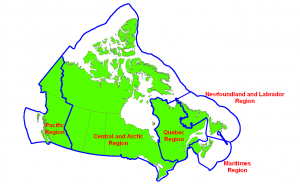
If you love swimming in the ocean and long walks on the beach, you will be amazed to know that Canada’s coastline is 243,000 km to 243,977 km (151,600 miles) in length. The longest coastline in the world! Yay! That’s a lot of walking and swimming! The shores of the 52,455 islands are a big contributor to the coastline.
6. Some really old rock: The Canadian Shield
Some of the oldest rock on this earth is found in our very own Canadian Shield.
The Shield surrounds the entire Hudson Bay area. It forms a U-shape that extends from Lake Superior in the south to the Arctic Islands in the north and from the western part of Canada eastward to Greenland.
The north part of the Canadian Shield is an area of rock weathered by the last ice age, thinly soiled, rich in minerals, with lakes and rivers covering the area in fragments.
7. Largest source of freshwater globally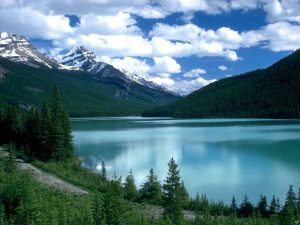
There are so many lakes throughout Canada that it is of no surprise that Canada has the largest source of freshwater supply in the world.
Two of the largest lakes in the world are in the Northwest Territories: Great Bear Lake (31,328 km²) and Great Slave Lake (28,568 km²).
8. The world’s largest island within an island
Upon researching Canada’s islands, there i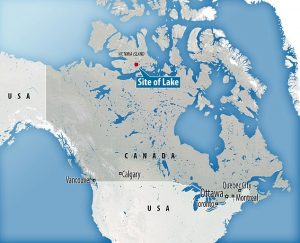 s an island within an island that measures about four acres and is located within the Arctic upon a lake. Not many of us know about this treasure that lies within our very own country and it is of no surprise that no one has even traveled to this island. The reason being that it isn’t accessible and it is about 75 miles inland from Victoria Island which is the eighth largest island in the world.
s an island within an island that measures about four acres and is located within the Arctic upon a lake. Not many of us know about this treasure that lies within our very own country and it is of no surprise that no one has even traveled to this island. The reason being that it isn’t accessible and it is about 75 miles inland from Victoria Island which is the eighth largest island in the world.
9. Get away islands
Canada has many islands. Three of the largest islands are: Baffin (507,451 km²), Victoria (217,291 km²) and Ellesmere (196,236 km²).
10. Mountain peak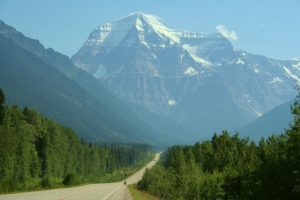
The tallest mountain in Canada is located in Yukon. Mount Logan is 5959 m high, equivalent to 19,551 ft. It is situated in Kluane National Park and Reserve in the southwest of Yukon. The mountain was named after Sir William Edmond Logan, a Canadian geologist and founding member of the Geological Survey of Canada.
I hope you enjoyed reading this fun article as much as I did writing it. Feel free to submit any comments you have about your favourite facts about the geography of Canada in the section below.
Happy Birthday Canada! Joyeux anniversaire Canada!




I have always found geographical facts and the geography underlying these facts that allow us to better understand our world to be intriguing. This may account for my having worked using my education as a geographer for almost 50 years. And there was even one in this list of which I was not aware…thank you Meena!
“almost half of the population in Canada were born in other countries!” – This should be 20% according to Statistics Canada https://www12.statcan.gc.ca/nhs-enm/2011/as-sa/99-010-x/99-010-x2011001-eng.cfm
Really enjoyed this article; info and your writing. Thank you!